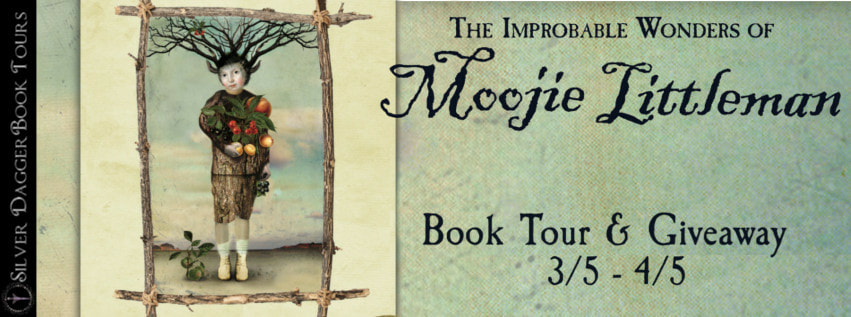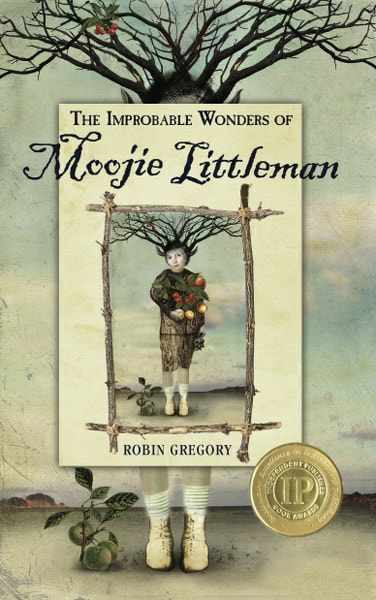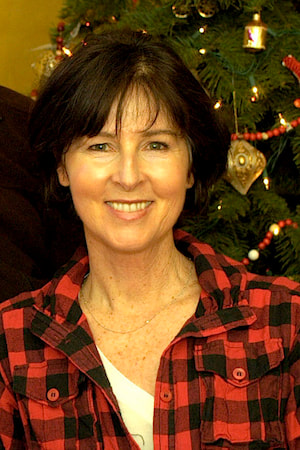The Improbable Wonders of Moojie Littleman by Robin Gregory Book Tour and Giveaway :)
The
Improbable Wonders of Moojie Littleman
by
Robin Gregory
Genre:
Fantasy, Magical Realism
Early
1900s, Western America. A lonely, disabled boy with a nasty temper
and uncontrolled mystical powers, Moojie is taken by his father to
his grandfather's wilderness farm. There, Moojie meets an
otherworldly clan of outcasts that he wants to join. Following a
series of misadventures--magical and mystical--he is summoned by the
call to a great destiny ... if only he can survive one last
terrifying trial.
Having
won a number of awards, Robin Gregory's The Improbable Wonders of
Moojie Littleman is being lauded as a classic. A haunting, visionary
tale spun in the magical realist tradition of Gabriel Garcia
Marquez's One Hundred Years of Solitude and Madeleine L'Engle's A
Wrinkle in Time, the profoundly unique voice and heart-stirring
narrative recall great works of fiction that explore the universal
desire to belong.

He
arrived on the heels of an earthquake. A minor hiccup as disasters
go, the murmur rippling undersea, causing dories in the bay to bob
and spider crabs to flood the beach like a ghostly pink tide. It was
the sort of earthquake that hushes everything for an instant before
nesting birds and sleeping butterflies burst out of trees. It makes
your heart jump for joy because you realize the earth is flying
through space at one thousand miles per hour and you have been spared
the dreadful experience of the whole world falling apart and having
to put it back together. It was the sort of earthquake that the nuns
of San Miguel de las Gaviotas would call a mystical grumble. Really,
there was nothing about it to suggest the terrible wonders looming on
the horizon. At
a quarter past seven, the candelabras in the chapel stopped swaying.
The nuns crossed themselves, went outside and found a wooden fishing
bucket on the porch. Expecting the catch of the day, they were
nothing short of horrified to see a baby boy bundled in fur and
tucked inside it. He had bright black eyes, enormous ears, and his
hair was the texture of caterpillar fuzz. “He’s
a Hostile, if I ever saw one,” said Mother Teagardin. The
word Moojie had been smudged across his forehead. And that was
what they called him—a peculiar name for a peculiar boy, who wasn’t
particularly welcome. Against her better judgment, Mother Teagardin,
who always said the natives were ill-suited for local society, hadn’t
the heart to surrender him to the local Bureau of Questionable
Peoples. She appealed to the local families to adopt him. But the
villagers were a superstitious lot. They believed the mysterious
child to be, well, too mysterious. It
didn’t help that before he cut his first teeth, Moojie amused
himself by magically snuffing out candles with the blink of an eye,
and by sending objects into flight with the power of his mind. When
he didn’t get his way, he caused the wind to rip off the nuns’
veils and flash their knickers. Like Odysseus, he was quick to act
and slow to regret. Meanwhile, the sisters clicked their clickers,
and swatted his bottom, and continued looking for a family for him. Except
for one early chapter of his childhood, Moojie was a virtuosic flop
when it came to the only thing he cared about: finding and keeping a
family. This
golden parenthesis began just before he was one year old, when Henry
and Kate Littleman, a childless couple who had moved from the East
Coast to San Miguel—along with hundreds of recent immigrants from
Europe and the Far East, since America had opened her doors to the
world—took him home to raise as their own. Mamma immediately left
her post as a science and French teacher at the Charles Darwin Free
School to look after him. Mornings, she tucked him into a knapsack
suspended
from a tripod, and went about her housekeeping. He grinned and
giggled as she baked bread, smoked little cigars, knitted hats and
booties, and arranged his wet flannel diapers on a drying rack near
the fireplace. She wheeled him to the beach in a wicker pram, where
they collected spider crabs and napped in the salty sand; she rocked
him before a glowing wood stove; she bathed and coddled him. He
watched Papa, a mapmaker, spin his curta and level his transit, slurp
scalding tea, and
leap out the door every morning in a pocketed vest. Sometimes, in the
afternoon, Papa played piano for him or showed off his soccer moves
in the backyard. In
those days, Moojie was a model child, the ambassador of lovability. He
delighted at being the center of attention, always looking intently
into people’s eyes, always smiling, as if he were in on some cosmic
joke. In those days—before San Miguel de las Gaviotas had gone the
way of Atlantis, that is to say, before it fell out of favor with the
gods—Moojie was passed around at church like a peace pipe. Warmed
by his charm, suspicious villagers now lined up after the service to
take turns holding him. Once Mrs. Littleman contrived a plot to put
the smiling Moojie into
the
arms of a miserable scrooge, and everyone sighed with awe as the
long-suffering soul wept and sang praises to God in heaven. “Have
you noticed, my cupcake?” Mamma said to Papa as she pushed the pram
home from church. “This is no ordinary child.” “He’ll
make a fine field hand, lovey,” Papa said. At
the time, San Miguel de las Gaviotas was a nick on the Pacific Coast
of America, a clammy, cluttery mishmash of thatched rooftops,
crumbling walls, and crooked towers surrounded by rugged mountains
that rose out of fog like ancient pyramids. Moojie’s new home,
Number 11 Wimbley Wood, a mildewy cottage with a drip line and
assorted mushrooms growing in the basement, appealed to otherworldly
visitors. Only
Moojie could see the celestial bodies spinning and whirling all about
him. And he sometimes heard voices beyond the range of normal hearing
—gifts, of course, that he did not yet understand. In the witching
hours, lights floated down through the ceiling over his crib. He
giggled and tried to grasp them as they bobbed playfully into and out
of his hands. Mamma came in and held him in the rocker, while moths
and flower flies haunted the spirit lamp—like all that is born,
seeking to return to light. Having
landed in the nucleus of love, charming, handsome Moojie surpassed
his parents’ every expectation, blessing them with unmitigated joy. But
all of that was soon to change.
ROBIN GREGORY is a devoted wife and mother, and student of mystical teachings. Born in Pensacola, Florida, she grew up in California, accompanied by seven siblings, and surrounded by horses, real cowboys, and the occasional rattlesnake. She has always been drawn to helping others, a trait that began, to her mother’s horror, with bringing home swallow chicks stricken from their nests. She has worked as a journalist, lay minister, and infant massage instructor for mothers and babies at risk. Her studies include Literature and Creative Writing at University of California, Santa Cruz and Stanford University’s Writer’s Workshop. She lives with her husband and son in a Carmel cottage old enough to make you sneeze. “The Improbable Wonders of Moojie Littleman” is her first published novel.
What
Saves Me From Discouragement
A
few years back, I was feeling pretty discouraged about my writing
career. There had been
weeks,
months, and years when my best writing efforts went unrewarded. I
could wallpaper my
living
room with rejections from publishers and agents. The little critic
inside kicked against my
visions,
daring me to think I was worthy to be a writer. With every rejection,
it hissed and snarled
and
said, “I told you so.” And if that didn’t stop me, there was
always J.K. Rowling, Diana
Galbadon,
and Zadie White to remind me of my literary irrelevance. The great
monument of
faith
in my talent had crumbled and taken heaven with it.
Around
that time, I visited the Sagrada Familia cathedral in Barcelona,
Spain. The primary
architect,
Antoni Gaudí, worked on it for 43 years, before passing on. Still
under construction
today,
it represents a century-long collaboration which is scheduled for
completion in 2020.
What
astounded me about the cathedral, beyond its mind-boggling beauty and
crafting, was that
literally
hundreds and hundreds of architects, artisans, masons, builders, and
artists formed
links
to its creation. “The creation continues incessantly through the
media of man,” said Gaudí.
In
that sense, Sagrada Familia represents how inspired visions get
erected: they start in the
imagination.
And the imagination needs the freedom to broadcast itself.
This
realization was like a slap on the face. It woke me from a stupor. It
made me remember
why
I loved writing. I gathered myself up again, remembering that I once
trusted the process like
a
child. I used to enter so fully into writing that I would laugh and
cry and growl as I went along.
With
this recollection, the “cathedral” of inspiration reappeared, and
I immediately resumed
writing.
Sadly,
Gaudí didn’t live long enough to see the finished Sagrada. But I
imagine it was complete
in
his mind, a testimony to heaven on earth, a living thing. In the same
way, we who build
cathedrals
out of words may not see the results hoped for. But our efforts are
not wasted. It’s the
process
that unites
us, a shared evolution. The best results are what happens to me while
I am
writing
for the pure joy of it, when I approach it as a kid playing in the
sand. That kid never gets
bogged
down with results or concerns for the future. She is fully present in
the act of creation—
free
and open. If we do not honor this part of ourselves, who will?
Follow
the tour HERE
for exclusive excerpts, guest posts and a giveaway!









🙏🏾🌻🌿🙏🏾♥️ Many thanks, Maiden of the Pages, for lending support for my giveaway! I really appreciate that you took time out of your busy day to help out. Warm blessings.
ReplyDelete